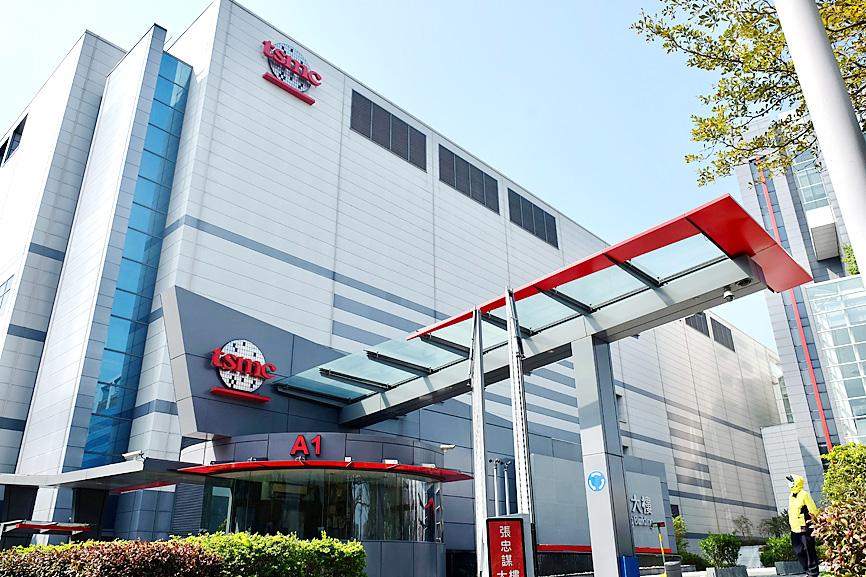Taiwan Semiconductor Manufacturing Co (TSMC, 台積電) yesterday unveiled a plan to hire 9,000 people this year in the latest round of recruitment as the chipmaker races to boost capacity to alleviate a chip crunch and safeguard its technology advantage.
TSMC’s talent recruitment this year might be the most ambitious in its history, while last year’s drive of 8,000 added recruits doubled the 4,000 new hires that it averaged over the preceding few years.
The latest drive — for fabs in Hsinchu, Taichung and Tainan — aims to catch up with growth in the company and new technology development, the Hsinchu-based chipmaker said.

Photo: Sam Yeh, AFP
The annual hiring campaign was launched amid shortages of a variety of chips, especially auto chips.
In January, the company revised its five-year revenue forecast to growth of 10 to 15 percent from a previous estimate of 5 to 10 percent, which it attributed primarily to stronger-than-expected demand for applications using high-performance computing and 5G smartphones.
TSMC in January said that it plans an annual capital expenditure of US$25 billion to US$28 billion (US$884.14 million to US$990.24 million), mostly to develop and manufacture advanced 3-nanometer, 5-nanometer and 7-nanometer chips.
The recruitment plan would bring the chipmaker’s overall headcount to more than 60,000 employees, up from 51,297 at the end of 2019.
TSMC hosted a recruitment event at National Taiwan University yesterday, the first in a series of hiring activities to take place at local universities this month and next.
The company expects about 3,000 students to sign up for job interviews, and said that next month it would begin accepting applications to a new internship program.

Application-specific integrated circuit designer Faraday Technology Corp (智原) yesterday said that although revenue this quarter would decline 30 percent from last quarter, it retained its full-year forecast of revenue growth of 100 percent. The company attributed the quarterly drop to a slowdown in customers’ production of chips using Faraday’s advanced packaging technology. The company is still confident about its revenue growth this year, given its strong “design-win” — or the projects it won to help customers design their chips, Faraday president Steve Wang (王國雍) told an online earnings conference. “The design-win this year is better than we expected. We believe we will win

Intel Corp chief executive officer Lip-Bu Tan (陳立武) is expected to meet with Taiwanese suppliers next month in conjunction with the opening of the Computex Taipei trade show, supply chain sources said on Monday. The visit, the first for Tan to Taiwan since assuming his new post last month, would be aimed at enhancing Intel’s ties with suppliers in Taiwan as he attempts to help turn around the struggling US chipmaker, the sources said. Tan is to hold a banquet to celebrate Intel’s 40-year presence in Taiwan before Computex opens on May 20 and invite dozens of Taiwanese suppliers to exchange views

Chizuko Kimura has become the first female sushi chef in the world to win a Michelin star, fulfilling a promise she made to her dying husband to continue his legacy. The 54-year-old Japanese chef regained the Michelin star her late husband, Shunei Kimura, won three years ago for their Sushi Shunei restaurant in Paris. For Shunei Kimura, the star was a dream come true. However, the joy was short-lived. He died from cancer just three months later in June 2022. He was 65. The following year, the restaurant in the heart of Montmartre lost its star rating. Chizuko Kimura insisted that the new star is still down

While China’s leaders use their economic and political might to fight US President Donald Trump’s trade war “to the end,” its army of social media soldiers are embarking on a more humorous campaign online. Trump’s tariff blitz has seen Washington and Beijing impose eye-watering duties on imports from the other, fanning a standoff between the economic superpowers that has sparked global recession fears and sent markets into a tailspin. Trump says his policy is a response to years of being “ripped off” by other countries and aims to bring manufacturing to the US, forcing companies to employ US workers. However, China’s online warriors